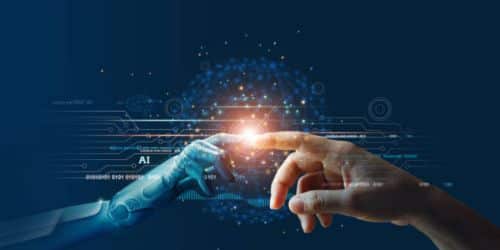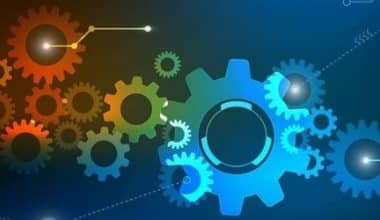AI, or artificial intelligence, refers to the ability of machines to exhibit intelligence, including perceiving, synthesizing, and inferring information. It involves the development of computer systems that can learn, reason, generalize, and infer meaning, similar to human intelligence. However, despite the benefits of AI technology, there have been major concerns and dangers that it poses, such as in the military and art sectors.
Applications of AI Technology
AI has a wide range of applications across various industries and domains:
#1. Robotics and Automation
AI plays a crucial role in robotics and automation systems. Robots with AI algorithms can perform complex manufacturing, healthcare, logistics, and exploration tasks. They can adapt to changing environments, learn from experience, and collaborate with humans.
#2. Financial Services
AI is extensively used in the finance industry for fraud detection, algorithmic trading, credit scoring, and risk assessment. Machine learning models can analyze vast amounts of financial data to identify patterns and make predictions.
#3. Healthcare
AI applications in healthcare include disease diagnosis, medical imaging analysis, drug discovery, personalized medicine, and patient monitoring. AI can assist in identifying patterns in medical data and provide insights for better diagnosis and treatment.
#4. Gaming
AI algorithms are necessary for gaming to create realistic virtual characters, opponent behavior, and intelligent decision-making. AI also optimizes game graphics, physics simulations, and game testing.
#5. Cybersecurity
AI helps detect and prevent cyber threats by analyzing network traffic, identifying anomalies, and predicting potential attacks. It can enhance systems and data security through advanced threat detection and response mechanisms.
Dangers of AI
Artificial intelligence (AI) poses several dangers to humans in various situations, including:
#1. Invasion of Privacy
AI technologies often collect and analyze large amounts of personal data, raising concerns about privacy and security. Governments and private corporations may exploit or monitor private citizens using AI technology, leading to privacy abuses and potential tracking of individuals. As the use of AI expands, implementing robust AI governance frameworks becomes essential to ensure privacy is respected and that data is handled responsibly.
#2. Discrimination and Socioeconomic Struggles
AI algorithms used in hiring processes or financial decision-making can lead to discrimination. For example, AI hiring programs may filter out candidates based on biased criteria, excluding certain groups of people. Additionally, AI’s impact on the job market can lead to socioeconomic struggles and individual job displacement.
#3. Economic Uncertainty
The rapid development of AI and automation can eliminate jobs and create economic uncertainty for individuals and families. According to a report by Goldman Sachs, AI could potentially eliminate 300 million jobs worldwide, including 19% of existing jobs in the United States.
#4. Security risks
As AI technologies become more sophisticated, the potential for security risks and misuse increases. Hackers and malicious actors can exploit AI to develop advanced cyberattacks, bypass security measures, and exploit system vulnerabilities. The rise of AI-driven autonomous weaponry also raises concerns about the dangers of rogue states or non-state actors using this technology without human control. Governments and organizations must develop best practices and regulations to protect against AI security threats.
#5. Ethical Implications
AI systems do not make decisions based on the same emotional or social context as humans. This lack of understanding can lead to unforeseen dangers, such as discrimination, privacy abuse, and political bias. The rapid development of machine learning technology can also raise concerns about the degradation of morals and the potential dangers of over-reliance on AI.
Dangers of AI Technology
As AI technology grows and becomes more visible worldwide, many individuals have raised concerns about the dangers and risks AI adoption poses to humans. With all its benefits, AI still poses different dangers and risks, which include:
- Loss of control: As AI systems become more capable and integrated into society, there is a risk of losing meaningful control over them, leading to potential misuse and abuse.
- Job displacement: AI’s potential to automate repetitive chores and other jobs may reduce human employment.
- Cybersecurity threats: AI technology can be vulnerable to cyberattacks, and cybercriminals may use AI to launch more sophisticated attacks. Also, using AI can increase the risk of data breaches and privacy violations.
- Data privacy concerns: AI-enabled devices often collect important personal information, raising privacy concerns. This data’s storage, protection, and control may pose risks to individuals and organizations.
- Manipulation and misinformation: AI systems can spread fake news, misinformation, and propaganda. Since, it is possible to create AI-generated content that mimics a person’s speech or behavior.
- Lack of AI implementation traceability: Shadow IT’s rise can cause a lack of traceability, control, and unauthorized AI implementations, increasing risks and vulnerabilities.
- Inability to explain consequential choices: AI systems may make decisions with significant consequences, but it can take time to understand and explain the reasoning behind those choices.
- Health issues: Excessive usage of AI-enabled platforms, such as social media, can have negative effects on mental health, including anxiety disorders, depression, and sleep deprivation.
- Environmental impact: The massive amounts of data generated and processed by AI systems contribute to global warming and various disturbances in weather patterns.
- Lack of transparency and accountability: AI systems handle massive amounts of data, resulting in disparities and errors that could threaten essential infrastructure.
- Warfare: AI can be used in warfare by training AI to kill or assassinate targets, raising ethical and humanitarian concerns.
- Laziness and addiction: AI applications can automate many tasks, making humans reliant on them and potentially leading to laziness and addiction. This can have negative effects on future generations.
Dangers of AI in the Military
The dangers of AI in the military can be significant and have various implications. Here are some key points to consider:
#1. Vulnerabilities in AI systems
AI systems used in the military pose different dangers due to attacks and manipulation. One such technique is poisoning, where the data used to train the AI system is altered to produce poor results. This can have serious consequences, such as misidentifying targets or falsely identifying civilians as combatants.
#2. Ethical Concerns
Using military-grade AI raises ethical questions about potential dangers, torture, and human rights violations. It also raises concerns about the military leadership’s lack of understanding and knowledge about AI systems, which can lead to uninformed decision-making.
#3. Autonomous Weapons and Warfare
Military-grade AI is often integrated into autonomous weapons systems, such as drones and robots, that operate without human oversight. This creates a new form of warfare where technology can be used to gain a competitive edge. There is a risk of an arms race between countries to stay ahead in developing and deploying AI weaponry.
#4. The Proliferation of AI Technology
China, Russia, and other countries actively develop and integrate AI into military operations. The potential proliferation of military AI by other state and non-state actors raises concerns about global stability and the risks of this technology falling into the wrong hands.
How to Deal With the Dangers of AI Technology in the Military
- Data governance and integrity: Implement data governance policies to improve the integrity and representativeness of the data used for AI systems. This can help reduce the risk of dangers due to poisoning attacks in the military and ensure AI systems learn correctly.
- Technical controls and human involvement: Place technical controls and ensure that well-trained personnel is involved in all AI lifecycle phases. This includes the development, training, and regulation of AI systems. Human operators should maintain positive control over the deployment and use of AI-enabled military systems.
- International cooperation: Seek greater technical cooperation and policy alignment with allies and partners regarding the development and employment of military AI. Explore confidence-building and risk-reduction measures with countries like China and Russia, who are also developing military AI.
- Public outreach and accountability: Conduct public outreach to inform stakeholders about the military’s commitment to mitigating AI-associated ethical risks. This can help avoid public backlash and policy limitations. Ensure that there is human accountability throughout the entire life cycle of AI systems.
Dangers of AI art
The art industry is one of the industries that has been largely affected by the use of AI. Today, multiple AI-generated images float the internet, with many unaware. There are multiple concerns about AI art, which can be categorized into ethical concerns, potential biases, and infringement of copyrights.
Ethical Concerns
AI-generated art can be used for political propaganda and spreading misinformation, as seen in social media algorithms manipulating public opinion during the 2016 US election and the Brexit referendum. AI art platforms raise concerns about replacing human artists and the potential profit from unpaid work.
Biases and Discrimination
AI art may be biased due to trained data, potentially underrepresenting certain groups and perpetuating societal biases, potentially leading to marginalization.
Copyright Infringement
AI art platforms using existing artworks raise concerns about copyright infringement if the generated art is too similar to the original work or resembles famous artists’ styles.
Managing the Dangers of AI Technology
There are several steps that can be taken to mitigate the dangers that AI technology poses to humanity. They include:
- Regulation and oversight: The development of AI should be subject to regulation and oversight to ensure that it is being developed safely and ethically.
- Balancing innovation and responsibility: It is important to balance high-tech innovation with human-centered thinking, ensuring that AI is developed for noble purposes and responsibly.
- Diversity of perspectives: When developing AI, it is crucial to seek insights, experiences, and concerns from diverse perspectives, including those from different fields such as economics, law, medicine, and philosophy.
- Ethical application: AI should be applied ethically, both at the company level and in society. This includes monitoring algorithms, compiling high-quality data, and explaining the findings of AI algorithms.
What Problems Can AI Not Solve?
AI has made significant advancements and has proven beneficial in various sectors and industries. However, there are certain problems that AI cannot fully solve. They include:
- Quality of data: AI’s effectiveness relies on the quality of data it receives, as its accuracy and reliability depend on the amount and quality of data used for training and analysis.
- Algorithmic bias: AI algorithms can be biased if trained on biased data or if they have inherent biases.
- Black box nature: AI systems often function as “black boxes,” hence, lacking transparency and explanation, raising concerns about accountability, trust, and ethical implications in critical domains.
- Lack of creativity: AI struggles with creativity and innovation, needing more ability to think outside the box and connect unrelated concepts, unlike human creativity.
- Inability to solve unknown problems: AI algorithms solve tasks in predetermined domains. Hence, it cannot discover and present unknown problems in a computable way.
- High costs: AI systems development and implementation are costly, requiring time, resources, and advanced technologies, hindering widespread adoption in certain sectors.
Can AI Take Over the World?
AI can disrupt various aspects of society, including the economy, employment, and wealth distribution. As AI technology advances, human labor may no longer be needed for certain tasks, leading to unemployment and wealth inequality. However, it is important to note that AI is a tool that can enhance human capabilities rather than replace them entirely. It can improve customer experiences, assist decision-making, and provide valuable insights.
Is AI More Dangerous Than a Nuke?
Some believe AI is more dangerous than nuclear weapons due to its exponential improvement rate. Hence, they have advocated for regulation and oversight to mitigate risks and promote a public body with scientific insight to ensure safe AI development. Also, better controls and laws are also necessary for a symbiotic relationship with humanity.
Can AI Become Self-Aware?
The possibility of AI becoming self-aware remains a debate among researchers and philosophers. Self-aware AI, also known as artificial consciousness or sentient AI, could possess human-level consciousness, intelligence, needs, desires, and emotions. However, current hardware and algorithms cannot support such AI. Some argue that AI’s self-learning and self-improvement capabilities could lead to subjective experience and consciousness, potentially creating superintelligent machines with their own subjective experiences. Developing a language or code to provide self-awareness or consciousness is beyond our grasp. Despite these challenges, researchers worldwide are working towards building self-aware AI, which could raise ethical questions and debates about the rights and status of self-aware AI.
How Will AI Affect Human Life?
AI has both positive and negative impacts on human life. It has revolutionized healthcare, transportation, and manufacturing industries, enabling medical diagnosis, treatment, and research. It can extend human lives and improve health outcomes. AI also frees humans from repetitive tasks, increasing productivity and job satisfaction. However, it may disrupt our lives, replace face-to-face communication, lead to unemployment and wealth inequality, and raise concerns about control and ethical use. The future of AI depends on its development, regulation, and usage, and it is essential to consider ethical principles and guidelines to maximize its benefits and mitigate potential risks.
Related Articles
- Benefits of AI in HR
- AI Marketing: Top 30+ Artificial Intelligence Marketing Tools
- AI COMPANIES: Top AI Companies Stocks to Invest In






